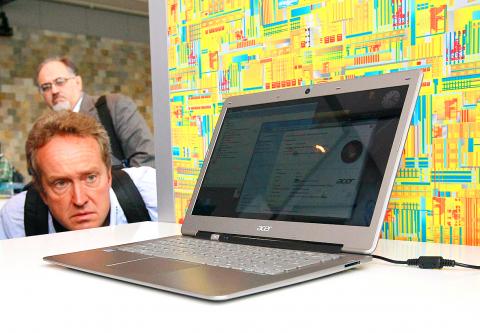Ultrabook laptop specifications will become the mainstream model for tablet PCs and notebooks in the next five years, Acer Inc (宏碁) chairman J.T. Wang (王振堂) said on Saturday.
Ultrabooks will help stimulate Taiwan’s information technology (IT) sector, Wang said at a press conference after the opening ceremony of this year’s IT Month Exhibition at Hall 1 and Hall 3 of the Taipei World Trade Center on Saturday.
Because the majority of Taiwan’s IT industry uses Wintel frameworks, the release of the ultrabook will propel the Wintel system forward, which has stalled over the past two years, Wang added. Personal computers running on Wintel systems use Intel processors with Microsoft Windows operating systems.

Photo: AFP
The line between laptops and tablets will become less distinct with ultrabooks entering the market this year, Wang added.
Most computer brands released ultrabooks in late October and last month.
The combined laptop and tablet market is growing at an annual rate of more than 20 percent and Wang predicted that the ultrabook would take up shares of both markets.
However, to increase ultrabook sales volumes, prices need to be kept at about US$699, Wang said. Prices of ultrabooks right now range between US$799 and US$1,299.
Forecasts of ultrabook sales in the fourth quarter of this year are positive and the company will keep shipment volumes at between 250,000 and 300,000 units, Wang added.
Intel has prepared a US$300 million deal with Acer and other IT companies to help improve ultrabook sales and costs, Wang said.
Wang also said that the global IT industry was shifting from developed countries to emerging markets because of slow growth in the former.
Besides markets in Brazil, Russia, India and China, Wang recommended Vietnam and Indonesia, citing World Bank economic outlook reports indicating that emerging markets with large populations had the most manufacturing and consumption growth potential.
The challenge for Taiwanese IT brands and manufacturers is how to build up business in emerging markets, Wang said.
For companies to operate long-term in these countries, they will need to familiarize themselves with local market demands, sales channels and business environments, Wang added.

In Italy’s storied gold-making hubs, jewelers are reworking their designs to trim gold content as they race to blunt the effect of record prices and appeal to shoppers watching their budgets. Gold prices hit a record high on Thursday, surging near US$5,600 an ounce, more than double a year ago as geopolitical concerns and jitters over trade pushed investors toward the safe-haven asset. The rally is putting undue pressure on small artisans as they face mounting demands from customers, including international brands, to produce cheaper items, from signature pieces to wedding rings, according to interviews with four independent jewelers in Italy’s main

Japanese Prime Minister Sanae Takaichi has talked up the benefits of a weaker yen in a campaign speech, adopting a tone at odds with her finance ministry, which has refused to rule out any options to counter excessive foreign exchange volatility. Takaichi later softened her stance, saying she did not have a preference for the yen’s direction. “People say the weak yen is bad right now, but for export industries, it’s a major opportunity,” Takaichi said on Saturday at a rally for Liberal Democratic Party candidate Daishiro Yamagiwa in Kanagawa Prefecture ahead of a snap election on Sunday. “Whether it’s selling food or

CONCERNS: Tech companies investing in AI businesses that purchase their products have raised questions among investors that they are artificially propping up demand Nvidia Corp chief executive officer Jensen Huang (黃仁勳) on Saturday said that the company would be participating in OpenAI’s latest funding round, describing it as potentially “the largest investment we’ve ever made.” “We will invest a great deal of money,” Huang told reporters while visiting Taipei. “I believe in OpenAI. The work that they do is incredible. They’re one of the most consequential companies of our time.” Huang did not say exactly how much Nvidia might contribute, but described the investment as “huge.” “Let Sam announce how much he’s going to raise — it’s for him to decide,” Huang said, referring to OpenAI

The global server market is expected to grow 12.8 percent annually this year, with artificial intelligence (AI) servers projected to account for 16.5 percent, driven by continued investment in AI infrastructure by major cloud service providers (CSPs), market researcher TrendForce Corp (集邦科技) said yesterday. Global AI server shipments this year are expected to increase 28 percent year-on-year to more than 2.7 million units, driven by sustained demand from CSPs and government sovereign cloud projects, TrendForce analyst Frank Kung (龔明德) told the Taipei Times. Demand for GPU-based AI servers, including Nvidia Corp’s GB and Vera Rubin rack systems, is expected to remain high,